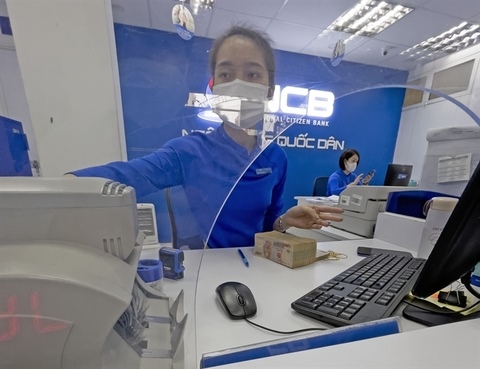|
Banks in race to boost charter capital
It is anticipated that there will be significant changes in the scale of the banking sector's charter capital this year as several joint-stock commercial banks have announced their plans to raise capital.

An employee performs a transaction at NCB's office. — VNA/VNS Photo
|
In a recently issued official dispatch, the State Bank of Vietnam (SBV) has granted approval to a number of banks to increase their charter capital through various methods, such as issuing shares for dividend distribution, conducting private placements and issuing shares to foreign strategic investors.
The banks include Liên Việt Post Joint Stock Commercial Bank (LPBank), National Citizen Commercial Joint Stock Bank (NCB) and SaigonBank.
NCB on January 2 said that the SBV allowed it to increase its charter capital to over VNĐ11.8 trillion (US$484.5 million). The lender will issue 620 million shares at VNĐ10,000 per share, bringing its charter capital from VNĐ5.6 trillion to VNĐ11.8 trillion.
The increase is to supplement capital for business activities and strengthen the bank's financial capacity.
The plan will be implemented after being approved by the State Securities Commission (SSC), expected in the second quarter of 2024. The transfer of these shares is restricted within one year from the date of completing the offering.
Similarly, LPBank was approved to increase its charter capital from nearly VNĐ20.6 trillion to VNĐ25.6 trillion.
Previously, the bank had already been granted permission to raise its charter capital by a maximum of nearly VNĐ11.4 trillion, as approved at the 2023 Annual General Meeting of Shareholders. Accordingly, it released over 328.5 million shares for dividend distribution at a rate of 19 per cent and also issued additional shares to existing shareholders with a total value of VNĐ5 trillion.
With the increased charter capital, LPBank continues to rank among the top private joint-stock commercial banks with the largest charter capital in the banking system.
In late December 2023, SaigonBank also obtained approval to raise its charter capital by up to VNĐ308 billion through a share issuance aimed at paying dividends to existing shareholders.
The bank's representative said that the increase in charter capital is essential for SaigonBank to enhance its financial strength and embrace technological advancements in line with industry trends.
On January 12, BacABank will finalise the list of shareholders receiving 2022's share dividends.
In particular, BacABank plans to issue more than 62.5 million shares to pay dividends at a rate of 7.5 per cent, meaning a shareholder owning 1,000 shares will receive 75 new shares. The number of fractional shares (if any) will be distributed to the bank union.
Charter capital plays a crucial role in measuring the Capital Adequacy Ratio (CAR) and determining the credit ratings of financial institutions. The CAR ratio is computed in accordance with Circular No. 41, which adopts internationally recognised Basel II standards and sets a minimum requirement of 8 per cent.
However, experts noted that despite the continuous plans of banks to increase their capital, especially in the fourth quarter of 2023, with numerous banks actively completing the necessary procedures to distribute shares to increase charter capital and provide additional resources, the Vietnamese banking system still faces capital constraints, with a significantly lower Capital Adequacy Ratio (CAR) compared to many other countries in the region.
In particular, several countries in the region have already implemented or partially adopted Basel III.
According to the latest data released by the SBV, as of May 2023, the total charter capital of the entire credit institution system reached more than VNĐ888.8 trillion, up 1.35 per cent from the end of 2022.
Bizhub
|